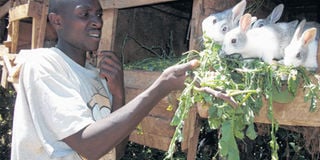The four key markets for your rabbits

Joseph Ngure feeds his rabbits at his farm in Molo. FILE PHOTO |
What you need to know:
- Rabbit Breeders Association of Kenya (Rabak) is another organisation that offers market. Peter Waiganjo of Rabak says the organisation liaises with the Ministry of Livestock in Thika to buy and slaughter the animals.
- Rabak, which deals in a variety of rabbit breeds that include Ear Lope or French Lope, New Zealand White, California White, Dutch, Chinchilla, Flemish Giant and Angora does not buy fur and skin.
Many times when an agribusiness idea is labelled a money spinner, people venture into it without considering the dynamics involved, particularly where to sell their products.
It happened with quails, where hundreds of people turned to keeping the birds, and soon the market was saturated with quail eggs, whose price dropped from Sh100 each to Sh10.
Currently, hundreds of people are keeping rabbits, and others are considering to join the trade because they have heard the animals fetch good returns.
Well, for rabbit farmers and those aspiring to join the trade, the market is huge.
Florence Ndambi of Rabbit Republic says they buy the animals and supply to hotels in Nairobi.
“We deal with over 500 farmers. We sell to them our hybrid rabbits and train them on the best feeds and hygiene procedures. We then buy their bunnies.”
They weigh, inspect and buy the live animals at Sh400 per kilo. The farmer is later paid in 14 days.
Florence says they are wary of buying rabbit from farmers whom they have not trained.
“While we do not guarantee market from such farmers, we pay Sh250 to Sh300 per kilogramme.”
Rabbit Republic, which is based in Hurlingham, Nairobi works with farmers in the city and Mombasa. They pick the rabbits from farmers.
“We come for a minimum of 30 rabbits in Nairobi but those outside Nairobi should be selling at least 50 rabbits.”
Rabbit Republic trains, sells and buys live animals. However, Florence says they also buy rabbit skin and fur for making bags and shoes, although this is on small-scale.
POPULARITY GROWING
Rabbit Breeders Association of Kenya (Rabak) is another organisation that offers market. Peter Waiganjo of Rabak says the organisation liaises with the Ministry of Livestock in Thika to buy and slaughter the animals.
“We slaughter every Wednesday morning. The exercise ends at 11am. We buy the rabbits at Sh360 per kilogramme. Payment is made in the afternoon.”
He adds: “Once the rabbit is slaughtered and skinned, it is inspected by a health official before it is packaged and sold to Uchumi supermarkets.”
They slaughter about 500 rabbits every Wednesday, but this does not match demand in the market.
“Rabbit meat is not yet very popular in the country but the demand is high. We do not have enough to supply to our market. We welcome more farmers to sell to us their rabbits,” he notes.
Rabak, which deals in a variety of rabbit breeds that include Ear Lope or French Lope, New Zealand White, California White, Dutch, Chinchilla, Flemish Giant and Angora does not buy fur and skin. After slaughtering, Waiganjo says they give the products back to farmers. Those who do not need the skin leave them at the abattoir, where they are disposed.
Rabak’s headquarters is housed in Thika West District Livestock Production Office. It serves farmers from Nairobi and Thika.
“Farmers who want to bring their rabbits to Thika must organise for their transport to the slaughterhouse. But we intend to expand to other counties so that we can reach more farmers.”
They also offer training on all aspects of rabbit farming that include production, how to set up a rabbit farm, cage construction, farming levels, market and diseases once every month at Sh1,500 per session.
Alcare Group is another organisation that buys rabbits. George Kibanya, the owner of the firm, says the company works with rabbit owners in 24 counties, out of the 47. These are Kiambu, Kajiado, Migori, Bomet, Machakos, Vihiga, Nakuru, Murang’a, Nyamira, Kakamega, Nyandarua, Uasin Gishu, Kitui, Bugoma, Trans Nzoia, Isiolo, Kericho, Nyeri, Taita Taveta, Malindi, Mombasa and Kilifi.
“We are working with about 1,000 rabbit farmers. Currently, we have about 800 farmers. We are open to about 200 more.”
Alcare, which deals mainly in Canadian Dorwan Giant Rabbits, slaughters about 3,000 animals in a month and exports to Canada.
“We insist on training the farmers, and then we sell them a stock of eight rabbits, of which six are female and they have been served (inseminated). In about four months, each of the female rabbits will produce about eight bunnies. We buy them at Sh500 per kilogramme.”
He adds: “This is contractual farming and we work with farmers who we know the type of feeds they are giving to the rabbits we buy. However, we still work with independent farmers who have rabbits not bought from us. However, we pay about Sh350 to Sh450 per kilogramme for their stock, depending on the type.”
Kenya Com Rabbit Consortium Ltd is an organisation that offers farmers market for rabbits’ by-products, mainly urine, which they use to make fertiliser.
To start selling urine to the organisation, one needs at least 20 rabbits. The company buys a litre of urine at Sh100.
“We use it to make fertiliser, which is a mixture of the rabbit urine and compost manure made from cow dung, wood ash, and foliage from plants. The mixture is put in a special digester and what comes out is an organic fertiliser called Rabbit Urine Extra,” said Robinson Runyenje, the director of KCRC in a recent interview.




